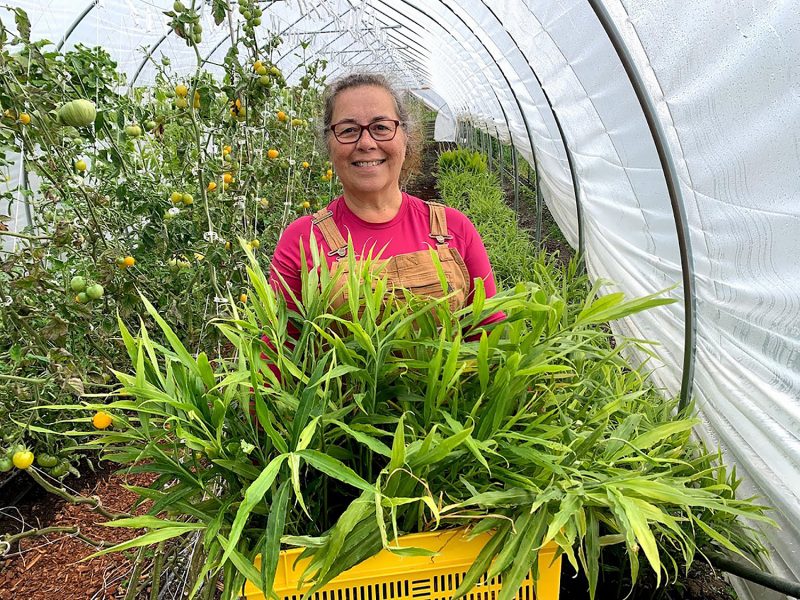COBBLE HILL – Tracey Wilkin and Don Nelson entered the agricultural industry later in life but apply previous job skills, including marketing and mechanical engineering, to bolster their market garden’s productivity and business strategy.
The middle-aged couple from Cobble Hill started their Sayward Haven Farm last year and just wrapped up their second growing season. They grow vegetables such as salad greens, carrots, turnips, radishes, tomatoes, cucumbers and fresh ginger, outdoors and in hoop houses.
“I’ve always been an avid gardener,” Wilkin says. “We value preserving the environment, particularly around climate change, so that was our inspiration.”
The couple formerly ran their own businesses, so the transition to operating a farm business happened “organically,” Wilkin says.
“We didn’t want to work for anybody, and we didn’t want anybody working for us,” Nelson laughs.
The couple were surprised by the physical demand of farm work. Fortunately, Nelson’s background in mechanical engineering saw them install solar-powered infrastructure that can be controlled from a smart phone.
They have optimized their watering system by using drip irrigation on timers and a central computer that tracks weather and precipitation patterns. Nelson uses coding and spreadsheets to calculate the optimal timing and amount of water that needs to be applied. They store water in a 9,000-litre tank.
“We dealt with the local water authority. They looked up our water usage and said that we use less water than some people use to water their lawns. It’s extremely efficient,” Nelson says.
This efficiency and ability to apply water when it’s most needed is important, especially during Vancouver Island summers. This August, most of the southern half of the island received just 1 millimetre of rain, pushing the region to a Level 5 drought by mid-October.
Nelson and Wilkin also built a wash and pack station and a walk-in cooler to maintain vegetable shelf-life during hotter months. Nelson’s cooler system uses a Coolbot, which hijacks a regular home air conditioner to keep the cooler’s temperature at around 3°C.
No easy feat
While the couple has invested in production-boosting infrastructure, starting a farm during last year’s heat dome and adjusting to the weather extremes since has been no easy feat.
They tripled the size of their garden this year and despite the expansive build-out and challenges of growing during record-breaking temperatures last summer, “we’ll be lucky to do the same amount of sales as last year,” Nelson says. “That’s how much of an impact the spring had.”
Pests and weeds are additional challenges. This spring, they lost 80% of their crops to wire worms, and weeds are a constant battle.
“You can only pull so many weeds. I was introduced to the old idea of flame weeding,” Nelson says. “I got a hold of that just in time for the fire ban. We wish we had people available, like a community that we could phone up and seek advice.”
Wilkin echoes the need for reliable information that is applicable to a market-garden scale.
“There are not a lot of resources for market farmers. Lots for big farmers but having community and knowledge-based support for market farmers – there’s not as much industry information out there. And we’re constantly battling Mother Nature,” she says.
Fortunately, because of their professional backgrounds in business management, the couple drew up a realistic business plan and run their farm to make profits. Project management software is one tool they use to keep track of notes and important year-over-year data.
Overall, the couple recommends that farmers – of any age and level of expertise – should invest in technologies that will improve operational efficiency.
“What we lack in energy and what we can feel in our bodies we make up for in the fact from a financial standpoint, we were able to make an investment in the efficiency stuff up front,” Wilkin says. “Anyone looking to get into it, really look at where you’re going to get efficiencies for yourself in your work. Make sure you’re making investments early on [in equipment] that you really need. It doesn’t need to be fancy. Get the barebones in place and then you can augment and invest in the nice-to-have things.”
Proceed with caution
While automation has its benefits and can bolster production, farmers, especially those in rural or remote areas, may face barriers to adoption and they should do their research.
Some of these hurdles include lack of Internet connectivity, platform subscription and equipment costs, and sensitivity around data usage, says UBC’s LiteFarm team product manager Kevin Cussen.
“Farmers are oftentimes either maliciously or carelessly kind of taken advantage of by people that are building tools,” Cussen says.
LiteFarm is a free and open-source farm management tool co-designed by farmers. Producers who use the tool retain control over their data, which can be used for commercial or research purposes only with their consent.
If farmers choose to adopt third-party automation tools, Cussen urges them to read the fine print.
“When they’re choosing tools to automate, [ask] what does the organization do with my data? Are they going to use it for research purposes? … Are they going to use it for commercial purposes? Sell it?” Cussen says. “Or is it just going to sit there, and no one will ever see it except for me? What your data is used for and how that impacts the farmer is another angle that many producers [should be] interested in.”


 BC Tree challenge falls short
BC Tree challenge falls short